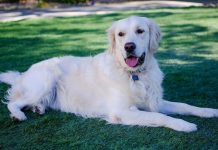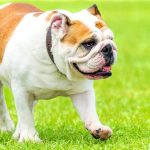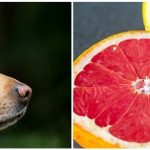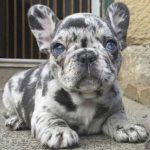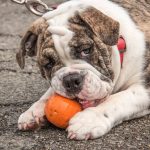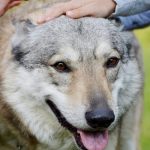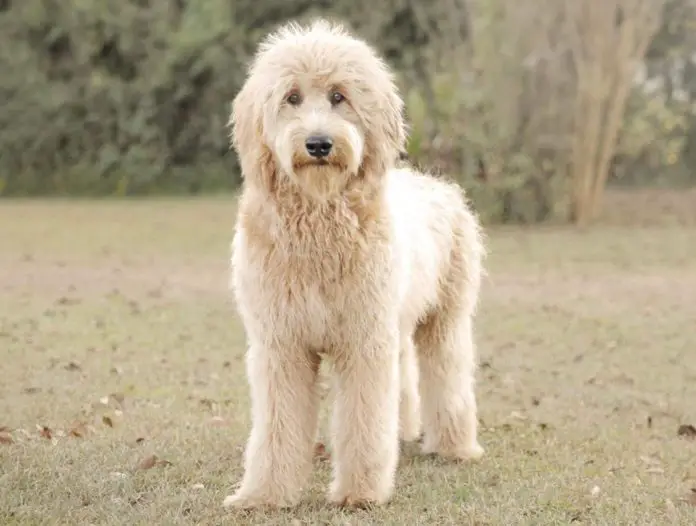
The English Goldendoodle is a cross between a Poodle and an English Golden Retriever. This breed is known for its intelligence, sociability and tolerant nature. The English Goldendoodle loves human company and can be a good therapy or service dog.
They are also great family companions. This breed doesn’t respond well to ruthless corrections as it ruins their self-confidence. Continue reading and learn whether this breed is really right for you.
Appearance
The English Goldendoodle is available in a wide range of colors, size sand shapes. The most common color is golden, but you can also find black, red, gray, apricot, copper, cream, golden and white Goldendoodles.
Their coat may lighten as they age. English Goldendoodles can have a curly or wavy coat. Their hair is longer on the ears, tail, body and legs than on the head and muzzle.
This breed is a light shedder, but they still benefit from some grooming. If you want to keep the coat in its natural condition, you have to brush your dog every 1 or 2 weeks. This breed usually comes in 3 sizes – Small Standard, Large Standard and Miniature.
The Small Standard stands at 17″ to 20″ tall and weighs 40 lbs and 50 lbs. The Large Standard weighs 50 lbs to 90 lbs and is 20″ to 24″ in height while the Miniature Goldendoodle usually stands at 13″ to 20″ tall and weighs 15 lbs and 35 lbs.
The English Goldendoodle Temperament
The English Goldendoodle is highly affectionate, loyal, patient and gentle. With proper training, this breed can be extremely obedient. At the same time, they can be mischievous and playful. The temperament of this breed is influenced by other factors such as socialization, heredity and training.
English Goldendoodle pups have a nice temperament. They are playful, curious and eager to approach people. It is best that you see the parents of the pup to make sure that it has a good temperament. Meeting the parents’ relatives and the puppy’s siblings can also help you evaluate what the pup will be like when it grows up.
English Goldendoodles should be socialized from a young age. They should be exposed to different sights, experiences, sounds and people. By doing so, your pup will become a well-rounded dog when he grows up. You can enroll the pup in a kindergarten class for puppies. Take him to stores that allow pets and to dog parks.
Invite visitors over on a regular basis. You can also take your pet out for leisurely walks to improve their social skills. By doing this, your English Goldendoodle will grow up into a sociable dog who loves to be around other people and pets.
Are English Goldendoodles Good Around Kids and Other Pets?
The gentle and calm demeanor of English Goldendoodles makes them good house pets. They are usually not aggressive towards other animals but, as mentioned earlier, you should socialize them from puppyhood.
The initial contact between older English Goldendoodle puppies and other animals should be supervised until you’re confident that they are at ease with each other.
You should use what you know about your pets. For instance, smaller dogs may show an unpleasant behavior when dealing with larger dogs. While your English Goldendoodle may not show any aggression signs in general, you also have to make sure that he’s not angered by the aggression shown by other pets.
English Goldendoodles are likely to get along with kids of all ages, especially if they take after their Golden Retriever parent. For your peace of mind, you should teach your kids how to touch and approach dogs.
You should also supervise the interactions between young children and dogs to prevent accidents. Tell your kids not to approach the dog while it is sleeping or eating. Dogs should not be left unsupervised with kids.
The English Goldendoodle Training
These dogs are easy to train since they are intelligent and love to please. These traits them a good match for experienced and first-time trainers. English Goldendoodles respond well to positive reinforcement and socialization puts off timidity or shyness, which is beneficial for a gentle breed like the English Goldendoodle.
Their energy level is average, so they have to be exercised every day. You can take them out for a walk or let them frolic in your backyard. A 20 to 30-minute exercise session will keep them from getting bored. You can also let the swim since they love water.
This breed is not suitable for those who live in apartments because they may grow big. English Goldendoodles need room to move around but they are not fit for kennel or outdoor living.
These dogs are the happiest when they are with their humans, so they should be kept mostly inside the house. This breed may develop separation anxiety and display destructive behavior if left alone for a long period of time.
The English Goldendoodle Feeding
Look for a dog food formula with high quality sources of fat and protein. The dog food should have meat protein and the ingredients should include beef, lamb, chicken and other whole meat. Meat meals can also contain protein as they are a concentrated kind of meat that has had the moisture removed.
Dog food can also contain plant protein such as lentils and peas. Healthy fat sources include flaxseed, chicken fat and canola oil. Choose a dog food formula that is low in carbohydrates in order to maintain your pet’s blood sugar level. Dog food formulas may include low-glycemic forms of carbohydrates like sweet potatoes.
You should also find a formula that contains Omega-3s as this fatty acid can help keep your dog’s coat and skin healthy. If your pooch is sensitive or allergic to grains, look for a dog food formula that contains oats or barley.
Avoid foods that contain artificial flavors, preservatives and colors, common allergens such as soy, corn, dairy products and wheat as well as excessive amounts of nutrients.
The English Goldendoodle Grooming
These dogs may be suitable for people who have allergies because they shed lightly or don’t shed at all. On top of that, they have low dander levels and need to be brushed once or twice a week to help prevent matting.
You can also clip their hair every few months, so you don’t have to maintain it. If you have allergies, you should get an F1B or F1 Goldendoodle. Give your pooch a bath only when it’s needed. If he’s bathed often, he will lose important oils that are required for a healthy and shiny coat.
Check his ears on a regular basis for bad odor or redness that could indicate an ear infection. Since they can’t say when they are in pain, it is up to you to take good care of your pet. If you see signs of unpleasant odor or redness, you should take your pooch to the vet for a check-up.
The Health Issues of English Goldendoodles
They are healthy dogs, provided that they are cared for properly. However, this breed is also prone to hip dysplasia, an inherited condition wherein the thighbone doesn’t fit properly into the dog’s hip joint. X-ray screening is the best way to identify the problem. This is because some dogs don’t show obvious signs of discomfort.
Dogs can develop arthritis as they grow older. Breeders should conduct an OFA or PennHIP exam before breeding parent dogs. English Goldendoodles may also develop elbow dysplasia, a degenerative disease that causes a weakened and malformed joint.
These dogs could develop arthritis or become lame. Possible treatment options for this condition include anti-inflammatory medication, weight management, surgery and medical management.
English Goldendoodles may also develop inheritable eye disorders such as Progressive Retinal Atrophy. The dog becomes night-blind and eventually loses sight completely. Many affected dogs become accustomed to their lost or limited vision, provided that their environment remains the same. CERF exams should be performed every year before the parent dogs are bred.
This breed may also suffer from the Von Willebrand’s Disease as well. This blood disorder hinders the clotting process. The dog displays symptoms like bleeding gums, nosebleeds and prolonged bleeding after whelping or during heat cycles. It has no cure, but it can be controlled with treatments such as avoidance of certain medications and transfusions before any surgical procedure.
English Goldendoodles may also develop allergies. Inhalant allergies are caused by pollen, mildew, dust and other airborne allergens and the treatment depends on the cause but it may include environmental changes, dietary restrictions and medications.
Food allergies can be treated by getting rid of the food that caused the allergic reaction in the first place. Contact allergies occur due to a reaction to topical substances like dog shampoos, bedding and flea powder.





